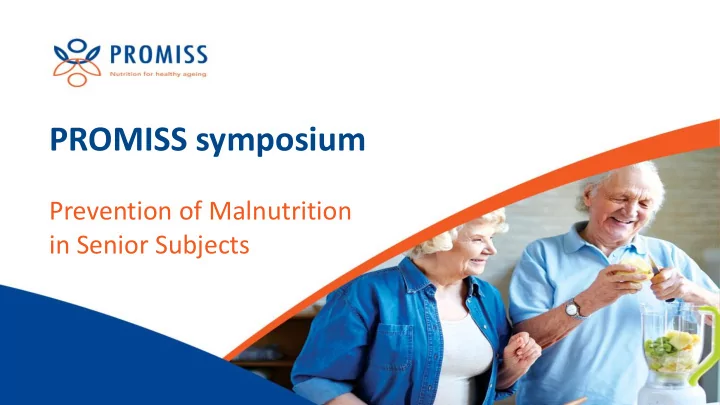

PROMISS symposium Prevention of Malnutrition in Senior Subjects
Agenda • General outline and objectives PROMISS project Marjolein Visser • Poor diet quality – incident malnutrition Linda Hengeveld (Health ABC) • Low protein intake - muscle strength and physical performance Nuno Mendonca (Newcastle 85+) • Dietary protein food patterns – incident frailty and disability Hélène Payette (NuAge) • Physical function and poor appetite Milan Chang (AGES)
CONFLICT OF INTEREST DISCLOSURE I have no potential conflict of interest to report
PRevention Of Malnutrition In Senior Subjects Coordinated by the Vrije University, Amsterdam Funded by the European Union’s Horizon 2020 research and innovation programme Grant n ° 678732. Budget: € 6,915,506 Duration: 5 years (2016-2021)
Partners of PROMISS Amsterdam Kick-off 2016
Prevention of protein-energy malnutrition in community-dwelling older adults
Why community-dwelling? 90-95% of older adults live at home Highest Hunting absolute ground for numbers of industry and malnourished SMEs older adults Community- dwelling Important older adults Awareness consumer relatively low market Prevent Prevent malnutrition malnutrition to reduce for active and care costs healthy aging
Objectives • Identify the relationships of (daily patterns of) food intake, food characteristics, physical activity, and the oral and gut microbiota with poor appetite, malnutrition and poor clinical outcomes in older adults; • Characterize the attitudes and preferences of older adults with regard to (daily patterns of) food intake, food characteristics, and physical activity by appetite and malnutrition strata; • Develop optimized, sustainable and evidence-based dietary and physical activity strategies to prevention of malnutrition and support active and healthy ageing; • Design new food concepts, new food products and electronic support systems that fit within these newly developed dietary strategies to support the prevention of malnutrition, and active and healthy ageing; • Disseminate and implement the newly developed holistic strategies and related practical recommendations in order to prevent malnutrition in all older EU citizens and improve health and health care.
WP1 Dietary intake and outcomes Cohorts: Longitudinal Aging Study Amsterdam (LASA, the Netherlands) Age, Gene/Environment Susceptibility-Reykjavik Age, Gene/Environment Study (AGES, Iceland) Susceptibility-Reykjavik Study Newcastle 85+ Study (UK) Quebec Longitudinal Study on Nutrition and Aging (NuAge, Canada) Health, Aging and Body Composition Study (HABC, USA)
WP1 Daily dietary patterns Surveys: • Dutch National Food Consumption Survey Older Adults (DNFSC, the Netherlands) • National FINDIET 2007 Survey (FINDIET, Finland) • Italian National Food Consumption Survey INRAN- SCAI 2005-06 (Italy) • INCA2 Survey (France) 24-h recalls or food diaries
WP2 Activity and sedentary behavior • Describe daily patterns of physical activity and sedentary behavior, also according to appetite and malnutrition strata • Study interactions between diet and physical activity in relation to outcomes • Methodological studies
WP3 Gut and oral microbiome • Nested case-control study in LASA participants Conducted at home Saliva / tongue swap / faeces samples Poor Taste & smell tests, Poor appetite appetite No weight Weight loss Detailed questionnaire loss Good Good appetite appetite No weight Weight loss loss
WP3 Gut and oral microbiome • Mouse experiments Diet Appetite & weight change • Long-term trial (WP8) Collect saliva/tongue swap/ faeces samples objective blood markers, fMRI in subsample
WP4 Preferences and attitudes • Large-scale consumer surveys in 5 countries • Survey 1: identify preferences and attitudes, also within appetite and malnutrition strata • To identify implications and recommendations for dietary and physical activity strategies and for food product development • Survey 2: Identify acceptance of and preferences for potential dietary and physical activity strategies, also within appetite and malnutrition strata
WP7 Food products and concepts “PROMISS kitchen” • Development of food concepts and food products • Road map for industry • Master class for industry
WP5 Strategies for prevention • Develop sustainable , feasible and (cost)effective dietary and physical activity strategies to prevent malnutrition and support active and healthy ageing • Develop modern technological solutions to support older adults in making healthy choices that fit within these strategies
WP6 Feasibility and short-term impact • Two experiments: N=60-100, 3-4 weeks – Test different prevention strategies – Examine barriers/enablers, compliance, dietary intake, actual product use, physical activity, appetite, body weight • Pilot study for long-term term trial • Experiment persuasive technology: N=20
WP8 Long-term (cost)effectiveness • 6 months intervention, N=500 • Two study sites: Amsterdam (NL) & Helsinki (FI) • Sample: 70+ y at high risk of malnutrition • Intervention: – optimal dietary strategy incorporating new food products – idem + optimal physical activity strategy – control group (no intervention) – in subsample yes/no persuasive technology • Primary outcomes: functional performance (SPPB) • Secondary outcomes: incident malnutrition, dietary intake, body weight, muscle strength, body composition, physical activity, frailty and quality of life.
WP9 Dissemination & implementation • Translation of strategies into practical recommendations • Dissemination of practical dietary and physical activity recommendations, roadmap and master class • Reach health professionals, industry, policy makers and older EU citizens
Thank you for your attention !
Recommend
More recommend